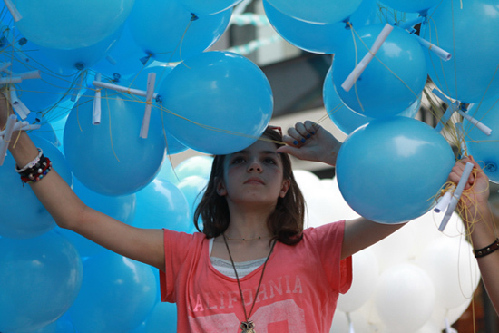Updated: 2013-07-03 09:40

A mixed crowd of Latin expats and Chinese gather for a blue-and-white balloon release to celebrate Argentine Flag Day. (China Daily/Cui Meng)
Latin rhythms haven't always dominated the nightlife in China's capital. When it opened a decade ago, the Sanlitun club Salsa Caribe was a lone sentinel for music like meringue.
But a series of recent openings suggests that dressing for dinner in the area now means: Bring your dancing shoes.
Argentina's Flag Day last week showcased new enthusiasm for the country's fancy-footed export: tango.
A blue-and-white balloon release organized by the Argentine embassy and Che Diego restaurant was followed by exhibition dances in the restaurant.
This is not a holiday special: Restaurateur Diego Kuo has booked the tango duo "Juan and Lisa" for daily exhibitions at lunch and dinner - sultry, steamy productions that may melt your dessert before you can eat it.
A few doors down at the recently opened Latin American and Caribbean Center, dance events have suddenly become as common as art exhibitions.
LACC's recent Flamenco Night is now a weekly event on Fridays, and the smitten can get formal lessons at the nearby Portacones Flamenco, the only dance studio in China authorized by both the Association of Spanish Dance Professionals and the Flamencology Jerez.
In August at LACC, the Cuban embassy is offering Chinese hoofers a chance to master authentic salsa. While this Latin dance has long had a solid following in China, the Cuban style is a bit different from what most people see on the international stage.
"There is lots of salsa in the US and London that's been popularized by the mass media," says the LACC's Geovany Santillan. But it's a little looser in style, he says, and it doesn't have the syncopated rhythm - in which a normally weak beat is stressed - that sets the real samba apart.
"So many Chinese want the experience of 'the mother' of the style," he says.
So the center and the Cuban embassy will kick off Salsa Cuba experience - sending about 100 Chinese enthusiasts to salsa "summer camp" for about 10 days. The dance experience will be intense enough to merit a certificate, but there will be some sun and beach fun on the side, too.
"They will learn from Cubans who perform and teach the dance the way that made it famous 50 years ago," he says, bouncing in his chair and slapping the arms to demonstrate the rhythm. "We'd like to send a hundred more Chinese about every three months, and the interest is definitely there."
